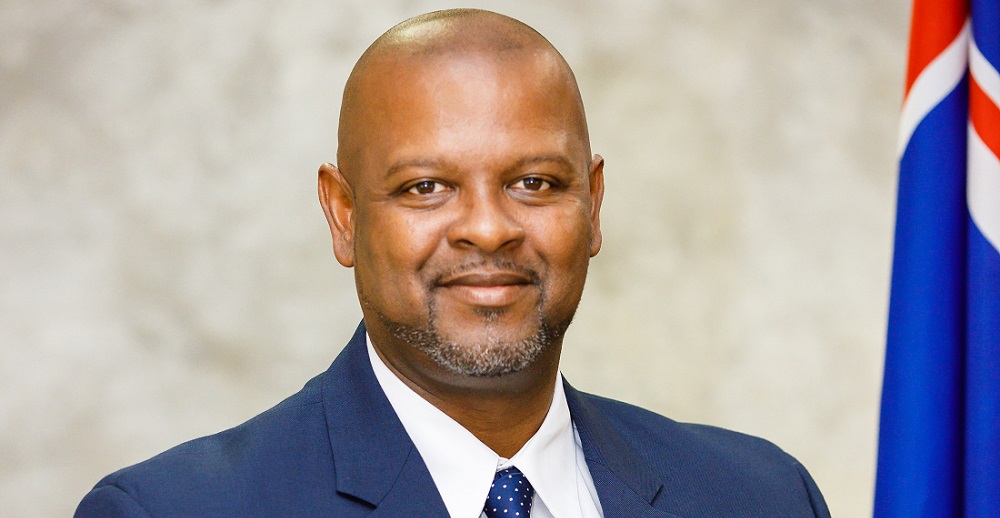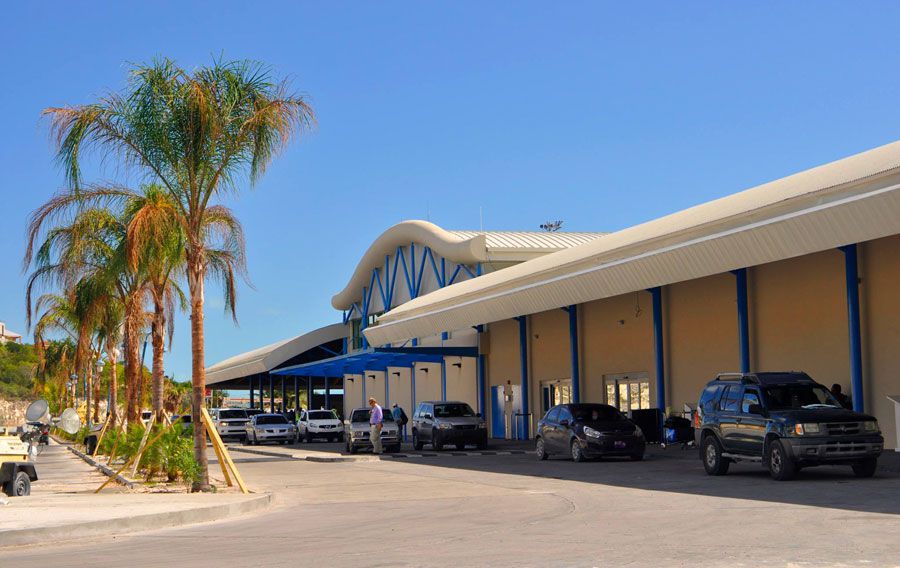#Providenciales, November 20, 2018 – Turks and Caicos – H.E the Governor, Madam Premier, Ministerial and Cabinet Colleagues, Officials of the Ministry of Border Control and Employment, Staff of the Immigration Department and the Press, good morning and welcome to this ceremony.
Ladies and gentlemen, on May 24, 2017, I commenced this initiative by signing the initial MOU between the USA and TCI making the Turks & Caicos Islands the first CARICOM associate member country amongst the six British Overseas Territories to sign on to the Advanced Passenger Information System, commonly referred to as APIS.
 At the 2017 signing ceremony I remarked that that the signing marked an historic occasion as the Turks and Caicos Islands embarked on a path of modernizing our border security regime through the cooperation agreement between the United States of America and the Caribbean counterparts.”
At the 2017 signing ceremony I remarked that that the signing marked an historic occasion as the Turks and Caicos Islands embarked on a path of modernizing our border security regime through the cooperation agreement between the United States of America and the Caribbean counterparts.”
The US ambassador also explained that by adopting APIS, countries would be better able to secure their airports and ports which leads them to enhancing regional security.
The signing today of this Memorandum of Understanding between the Government of the United Kingdom and the Turks and Caicos Islands signifies the culmination of the path to officially joining our regional counterparts in the introduction of the Advanced Passenger Information System (APIS). With the signing of this MOU, the United Kingdom Government formally grants consent to the TCI for the sharing of intelligence among Member States of the Caribbean Community.
This morning, I am proud again to state that the signing of this memorandum is a significant and important step to achieving and realizing the full implementation in the APIS in the Turks and Caicos Islands and by extension improved security for our region.
For the benefit of persons present today and the media, APIS is an automated system established for aviation and maritime operators. It has the capability of enhancing border security over the region by supplying law enforcement officers with data on passengers and crew members prior to arrival and departure from CARICOM member states, United Kingdom, United States and Canada. This system was established by the US Customs Border Protection agency (CBP) in May 2009.
I am sure the most common question would be, what TCI will derive from APIS.
The main contribution of APIS to our border management are:
- Prior to departure, law enforcement officials can know in advance whether potential or known offenders or inadmissible persons are travelling.
This not only provides us and our partners with adequate time to utilize our resources more efficiently, but also helps to reduce workload through the use of technology and automated means.
- The TCI capabilities for transmission of passenger details to the point of destination well in advance of the passengers’ arrival is a very positive step towards achieving both facilitation and compliance goals.
- Advance Passenger Information System, will involve capturing a passenger’s biographic data and other flight details by the carrier prior to departure and the transmission of the details by electronic means to the Border Agencies in the destination country.
- The TCI hopes to use APIS as a decision-making tool that Immigration and Customs primarily can employ before a passenger is permitted to board an aircraft. Once passengers are cleared for boarding, details are then sent to the Agencies for screening against additional databases and can identify passengers and crew of interest.
Ladies and gentlemen, APIS has the potential to considerably reduce inconvenience and delays experienced by passengers as a result of border processing. It will contribute to more efficient passenger facilitation by allowing border control officers, (Police, Immigration, Security and Customs Officers) to focus on high-risk individuals, thereby allowing for a faster throughput of low risk travellers when undergoing arrival formalities. This would add value to processing of our tourist and allow us to maximize use of staff at the airport in particular and improve guests experience.
As part of preparation to get to this stage today several key actions have taken place. Legislations has been enacted in 2017, training and consultation was undertaken in February 2018 with internal and external partners and stakeholders. The training/workshops included the Police, Immigration Department, Airports Authority, Computer Department, Customs, Maritime and Ports Authority. External partners that have been consulted and participated in training include Marina operators, Cruise lines, Airlines, shipping companies (air and sea), freight forwarders etc.
The workshops which were facilitated by the Joint Regional Communications Centre (JRCC) made use of the international best practices and standards highlighted above, as well as the Passenger Data Toolkit of the International Air Transport Association. JRCC are the regional managers of APIS, based on Barbados.
The ultimate goal of these national workshops was to design a Road Map indicating the main steps to follow to move towards an API-enabled environment. In addition, the workshops provided participants with a thorough understanding of the functions and benefits of APIS and brought together all relevant national stakeholders in the field of aviation security in order to promote cooperation and synergies as they implement an API system.
Increase in tourism over the past decade has impacted the manner in which passengers travelling on international flights are processed. What is even more challenging is that in the TCI we anticipate even greater growth with the demand for larger aircraft and associated demand on inspection processes during peak arrival and departure times.
You are probably also aware of increases in international terrorism, drug smuggling and serious crimes and associated security and the threat posed. These threats are not only akin to the Royal Turks and Caicos Islands Police and Immigration, but also by the carriers and airport operators. Drug smuggling by passengers is a substantial part of the problem even in the region. Additional security checks/risk assessments on passengers prior to departure have added considerably to the time required for the check-in process as we are all acquainted with the long lines, and thorough checks by TSA prior to departure from Miami. These are often adjusted due to changing risks factors. You see, threats from terrorism is real and no country is immune. The increased compliance risk posed by passengers has meant that border protection agencies have had to be more vigilant and more intensive in our processing of this type of traffic.
There are a variety of Border Control Agencies in place at the Providenciales International Airport. These include Customs, Immigration, Police, Health and Safety, Agriculture etc. The level of cooperation between these Agencies varies from place to place. Different agencies frequently operate their own automated systems for passenger processing without any sharing of information. The strict division of responsibilities between the agencies means that passenger processing is often unnecessarily prolonged. APIS will bridge and consolidate critical information that can be shared between agencies.
In terms of Border Control Agency response, it has become obvious that the routine examination of all passengers and their possessions is no longer a suitable way of processing the ever-increasing passenger numbers. Emphasis has shifted from a high percentage of passenger examinations, to a more selective approach based on risk assessment, intelligence, behavioural patterns, etc., as well as randomly applied inspection processes e.g Red/Green Line in Customs. It is now well recognized that such an approach yields significantly better results, proportionate to the manpower employed, than purely random or intensive examination. Again, APIS would complement this process.
APIS can easily facilitate pre-clearance of flights treating some flight as domestic flights thereby alleviating some of the pressure at the arrival airport, and enable more prudent use of critical staff elsewhere.
Although the level of co-operation between the various Border Agencies has improved in recent years in the TCI, more can be done to rationalize procedures, save on manpower and other resources, and facilitate passengers.
 Such cooperation will result in the clearance process for passengers being reduced in complexity to the level where a lesser number of Immigration or Customs will be able to process the vast majority of arriving passengers. It is envisage that the Officers, representing the various interested agencies, would be tasked with conducting a primary inspection of each arriving passenger, and referring those requiring additional examination to the appropriate service. In addition, with increasing inter-agency co-operation, the case for the development of single interagency automated systems, serving the needs of two or more agencies is possible in the short run.
Such cooperation will result in the clearance process for passengers being reduced in complexity to the level where a lesser number of Immigration or Customs will be able to process the vast majority of arriving passengers. It is envisage that the Officers, representing the various interested agencies, would be tasked with conducting a primary inspection of each arriving passenger, and referring those requiring additional examination to the appropriate service. In addition, with increasing inter-agency co-operation, the case for the development of single interagency automated systems, serving the needs of two or more agencies is possible in the short run.
APISs introduction will monitor persons for flight and assist border agencies to identify potential or likely offenders.
The Ministry, Immigration department, Computer Department and others will continue to work with the JRCC in the physical introduction of APIS within the new year.
In short this is a great initiative and we look forward to updating the public on its advancement.
I would like to take this opportunity to thanks the Government, Cabinet and my colleagues, Ministry and Department Staff, regional bodies including IMPAC, JRCC and United Kingdom Government for the assistance and support in advancing this significant project.
Thank you.

 News4 days ago
News4 days ago
 Health5 days ago
Health5 days ago
 Caribbean News6 days ago
Caribbean News6 days ago
 Caribbean News1 week ago
Caribbean News1 week ago
 Education3 days ago
Education3 days ago
 Caribbean News3 days ago
Caribbean News3 days ago
 Caribbean News1 week ago
Caribbean News1 week ago
 Bahamas News1 week ago
Bahamas News1 week ago














